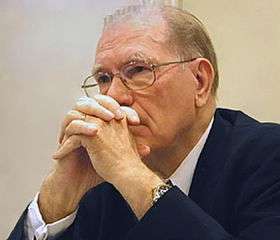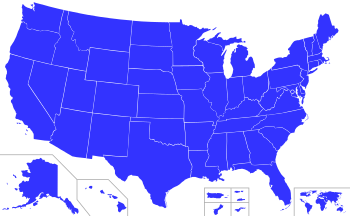Democratic Party presidential primaries, 2000
| | ||||||||||||||||||||||||||||
| ||||||||||||||||||||||||||||
| ||||||||||||||||||||||||||||
|
| ||||||||||||||||||||||||||||
| Gore won every statewide contest. | ||||||||||||||||||||||||||||
| ||||||||||||||||||||||||||||
The 2000 Democratic presidential primaries were the selection process by which voters of the Democratic Party chose its nominee for President of the United States in the 2000 U.S. presidential election. Incumbent Vice President Al Gore was selected as the nominee through a series of primary elections and caucuses culminating in the 2000 Democratic National Convention held from August 14 to August 17, 2000, in Los Angeles, California, but he went on to lose the general election against Governor George W. Bush held on November 7th of that year, despite winning the popular vote by 0.5% points.
Candidates
-
.jpg)
Former U.S. Senator
Bill Bradley
of New Jersey
(Withdrew March 9) -

Political Activist
Lyndon LaRouche
of Virginia
Primary race overview
The apparent front runner, Vice President Albert Gore Jr. of Tennessee, only faced one candidate in the primaries, U.S. Senator Bill Bradley of New Jersey. The two campaigned to succeed the 1992 and 1996 nominee, President Bill Clinton. During the course of the five-month primary season, Gore had managed to win every single primary contest over his rival, and was easily declared the party's nominee for the 2000 Election.
Serious early speculation surrounded Bill Bradley, a U.S. Senator and former basketball player for the New York Knicks, who had long been considered a potential Democratic contender for the presidency. In December 1998, Bradley formed a presidential exploratory committee and began organizing a campaign.[1] Gore, however, had been considered the favorite for the Democratic nomination as early as 1997, with the commencement of President Bill Clinton’s second term.[2] Though numerous candidates for the Democratic nomination tested the waters, including Senator John Kerry, Governor Howard Dean,[3] Representative Richard Gephardt, and Reverend Jesse Jackson, only Gore and Bradley ultimately entered the contest.
Bill Bradley campaigned as the liberal alternative to Gore, taking positions to the left of Gore on a number of issues, including universal health care, gun control, and campaign finance reform. On the issue of taxes, Bradley trumpeted his sponsorship of the Tax Reform Act of 1986, which had significantly cut tax rates while abolishing dozens of loopholes.[4] He voiced his belief that the best possible tax code would be one with low rates and no loopholes, but he refused to rule out the idea of raising taxes to pay for his health care program.
On public education, Bradley pushed for increased federal funding for schools under Title I, as well as the expansion of the Head Start program.[5] He further promised to bring 60,000 new teachers into the education system annually by offering college scholarships to anyone who agreed to become a teacher after graduating.[6] Bradley also made child poverty a significant issue in his campaign. Having voted against the Personal Responsibility and Work Opportunity Act, better known as the "Welfare Reform Act," which, he said, would result in even higher poverty levels,[4] he promised to repeal it as president. He also promised to address the minimum wage, expand the Earned Income Tax Credit, allow single parents on welfare to keep their child support payments, make the Dependent Care Tax Credit refundable, build support homes for pregnant teenagers, enroll 400,000 more children in Head Start, and increase the availability of food stamps.[6]
Although both Gore and Bradley showed comparable success in terms of fund-raising, Bradley lagged behind Gore in many polls from the start and never gained a competitive position. Despite the late endorsement of the Des Moines Register,[7] Bradley went on to be defeated in the Iowa Caucus; Gore garnered 62.9% of the votes, while Bradley received only 36.6%.[8] Gore won the primary competition in New Hampshire as well, though by a significantly smaller margin, receiving 49.7% to Bradley’s 46.6%. After a resounding defeat on Super Tuesday, with Bradley failing to carry the majority of delegates in a single state, he withdrew from the race on March 9.[9]
Polling
| Source | Date | Al Gore | Bill Bradley | Jesse Jackson | Dick Gephardt | John Kerry | Bob Kerrey | Paul Wellstone |
|---|---|---|---|---|---|---|---|---|
| Gallup | Sep. 6-7, 1997 | 49% | 13% | 15% | 7% | 5% | 4% | 0% |
| Gallup | May 8-10, 1998 | 51% | 8% | 12% | 7% | 2% | 3% | 1% |
| Gallup | Oct. 23-25, 1998 | 41% | 15% | 11% | 14% | 4% | 4% | 1% |
| Gallup | Jan. 8-10, 1999 | 47% | 12% | 11% | 13% | 5% | - | 1% |
| Gallup | Mar. 12-14, 1999 | 58% | 21% | 15% | - | - | - | - |
| Gallup | Apr. 13-14, 1999 | 54% | 34% | - | - | - | - | - |
| Gallup | Apr. 30-May 2, 1999 | 66% | 23% | - | - | - | - | - |
| Gallup | May 23-24, 1999 | 59% | 30% | - | - | - | - | - |
| Gallup | Jun. 4-5, 1999 | 63% | 28% | - | - | - | - | - |
| Gallup | Jun. 25-27, 1999 | 64% | 28% | - | - | - | - | - |
| Gallup | Aug. 16-18, 1999 | 58% | 31% | - | - | - | - | - |
| Gallup | Sep. 10-14, 1999 | 63% | 30% | - | - | - | - | - |
| Gallup | Oct. 8-10, 1999 | 51% | 39% | - | - | - | - | - |
| Gallup | Oct. 21-24, 1999 | 57% | 32% | - | - | - | - | - |
| Gallup | Nov. 4-7, 1999 | 58% | 33% | - | - | - | - | - |
Results
Statewide
| Bill Bradley | Al Gore | Lyndon LaRouche | ||
| January 24 (47) |
Iowa (caucus) | 36.60% (18) |
62.85% (29) |
0.55% |
| February 1 (22) |
New Hampshire (primary) | 45.59% (9) |
49.73% (13) |
4.68% |
| February 5 (0) |
Delaware (primary) | 40.18% | 57.24% | 2.59% |
| February 29 (0) |
Washington (primary) | 34.21% | 65.25% | 0.54% |
| March 7 (367) |
California (primary) | 18.19% (62) |
81.21% (305) |
0.60% |
| March 7 (54) |
Connecticut (primary) | 41.37% (24) |
55.60% (30) |
3.03% |
| March 7 (77) |
Georgia (primary) | 16.18% (12) |
83.82% (65) |
- |
| March 7 (20) |
Hawaii (caucus) | ?% (2) |
?% (20) |
?% |
| March 7 (18) |
Idaho (caucus) | ?% (4) |
?% (14) |
?% |
| March 7 (23) |
Maine (primary) | 41.26% (10) |
54.02% (13) |
4.72% |
| March 7 (68) |
Maryland (primary) | 28.45% (19) |
67.32% (49) |
4.23% |
| March 7 (93) |
Massachusetts (primary) | 37.17% (35) |
59.77% (58) |
3.06% |
| March 7 (75) |
Missouri (primary) | 33.56% (24) |
64.62% (51) |
1.82% |
| March 7 (243) |
New York (primary) | 33.46% (85) |
65.62% (158) |
0.92% |
| March 7 (14) |
North Dakota (caucus) | ?% (2) |
?% (12) |
?% |
| March 7 (146) |
Ohio(primary) | 24.70% (37) |
73.61% (109) |
1.69% |
| March 7 (22) |
Rhode Island (primary) | 40.35% (9) |
56.92% (13) |
2.73% |
| March 7 (15) |
Vermont (primary) | 43.89% (6) |
54.33% (9) |
1.79% |
| March 7 (75) |
Washington (caucus) | 28.20% (22) |
68.39% (53) |
3.41% |
| March 9 (43) |
South Carolina (caucus) | 1.78% | 91.79% (43) |
6.43% |
| March 10 (51) |
Colorado (primary) | 23.29% (7) |
71.43% (44) |
5.29% |
| March 10 (24) |
Utah (primary) | 20.14% (3) |
79.86% (21) |
- |
| March 11 (47) |
Arizona (primary) | 18.88% (7) |
77.89% (40) |
3.23% |
| March 11 (129) |
Michigan (caucus) | 16.27% (9) |
82.74% (120) |
0.99% |
| March 11 (74) |
Minnesota (caucus) | ~12% (2) |
~74% (72) |
~14% |
| March 12 (20) |
Nevada (caucus) | 2.22% | 88.91% (20) |
8.88% |
| March 14 (68) |
Tennessee (primary) | 5.26% | 92.13% (68) |
2.61% |
| March 14 (161) |
Florida (primary) | 18.17% (17) |
81.83% (144) |
- |
| March 14 (37) |
Mississippi (primary) | 8.60% | 89.62% (37) |
1.78% |
| March 14 (45) |
Oklahoma (primary) | 25.44% (7) |
68.71% (38) |
5.85% |
| March 14 (61) |
Louisiana (primary) | 19.92% (7) |
72.96% (54) |
7.13% |
| March 14 (194) |
Texas (primary) | 16.34% (12) |
80.24% (182) |
3.42% |
| March 21 (161) |
Illinois (primary) | 14.24% (12) |
84.35% (149) |
1.41% |
| March 25 (13) |
Wyoming (caucus) | 4.98% | 85.44% (13) |
9.58% |
| March 25 (15) |
Delaware (caucus) | ?% | ?% (15) |
?% |
| April 2 (51) |
Puerto Rico (caucus) | ?% | ?% (51) |
?% |
| April 4 (161) |
Pennsylvania (primary) | 20.73% (21) |
74.20% (139) |
5.07% |
| April 4 (77) |
Wisconsin (primary) | 8.77% | 88.55% (77) |
2.69% |
| April 15 (79) |
Virginia (caucus) | ?% | ?% (79) |
?% |
| April 22 (13) |
Alaska (caucus) | ?% | 68.39% (13) |
?% |
| May 2 (72) |
Indiana (primary) | 21.95% (10) |
74.91% (62) |
3.15% |
| May 2 (86) |
North Carolina (primary) | 18.31% (13) |
70% (73) |
11.27% |
| May 2 (17) |
Washington, D.C. (caucus) | - | 95.90% (17) |
4.10% |
| May 6 (36) |
Nebraska (caucus) | - | ?% (36) |
?% |
| May 9 (30) |
West Virginia (primary) | 18.44% (3) |
72.01% (27) |
9.55% |
| May 9 (26) |
Nebraska (primary) | 26.27% (5) |
69.38% (21) |
4.36% |
| May 16 (47) |
Oregon (primary) | - | 84.86% (47) |
15.13% |
| May 23 (37) |
Arkansas (primary) | - | 78.47% (37) |
21.53% |
| May 23 (0) |
Idaho (primary) | - | 75.73% | 24.27% |
| May 23 (49) |
Kentucky (primary) | 14.68% (3) |
71.26% (46) |
14.06% |
| June 6 (54) |
Alabama (primary) | - | 76.74% (54) |
23.26% |
| June 6 (17) |
Montana (primary) | - | 77.87% (15) |
22.13% (2) |
| June 6 (105) |
New Jersey (primary) | - | 94.89% (105) |
5.11% |
| June 6 (26) |
New Mexico (primary) | 20.57% (3) |
74.63% (23) |
4.81% |
| June 6 (15) |
South Dakota (primary) | - | ?% (15) |
?% |
Nationwide
| Al Gore | Bill Bradley | Lyndon LaRouche | Uncommitted | Others | |
| Popular Vote | 10,885,814 (75.37%) | 3,027,912 (20.96%) | 276,075 (1.91%) | 207,285 (1.44%) | 46,102 (0.32%) |
| Delegates | 3,007 (85.16%) | 522 (14.78%) | - | 2 (0.06%) | - |
Connecticut Senator Joe Lieberman was nominated for Vice President by voice vote. Lieberman became the first Jewish American ever to be chosen for this position by a major party. Other potential running-mates included;
- Tom Harkin, U.S. senator from Iowa
- Evan Bayh, U.S. senator from Indiana
- Barbara Boxer, U.S. senator from California
- John Edwards, U.S. senator from North Carolina
- Dianne Feinstein, U.S. senator from California
- Barbara Mikulski, U.S. senator from Maryland
- Dick Gephardt, U.S. House Minority Leader from Missouri
- Bob Graham, U.S. senator from Florida
- Jim Hunt, Governor of North Carolina
- John Kerry, U.S. senator from Massachusetts
- Bob Kerrey, U.S. senator and former Governor from Nebraska
- Zell Miller, U.S. senator from Georgia
- George Mitchell, former Senate Majority Leader from Maine
- Sam Nunn, former U.S. senator from Georgia
- Jeanne Shaheen, Governor of New Hampshire
See also
References
- ↑ Preston, Jennifer (December 5, 1998). "Bradley Takes First Step Toward Presidential Race". The New York Times. Retrieved May 1, 2010.
- ↑ APPLE Jr, R. W. (January 19, 1997). "Gore Is Crossing Starting Line for Year 2000". The New York Times. Retrieved May 1, 2010.
- ↑ Politics1 - Guide to the Inactive 2004 Democratic Presidential Prospects
- 1 2 Dao, James (September 22, 1999). "Moynihan to Endorse Bradley, Favoring Friend Over the Vice President". The New York Times. Retrieved May 1, 2010.
- ↑ Steinberg, Jacques (February 29, 2000). "THE 2000 CAMPAIGN: THE EDUCATION ISSUE; The Candidates' Homework on Schools". The New York Times. Retrieved May 1, 2010.
- 1 2 Bill Bradley for President 2000 Campaign Brochure
- ↑ "Des Moines Register endorses Bradley". CNN. Retrieved May 1, 2010.
- ↑ "CNN.com International". CNN. Archived from the original on March 17, 2008.
- ↑ Dao, James; Kristof, Nicholas D. (March 9, 2000). "THE 2000 CAMPAIGN: THE QUEST; His Early Promise Vanished, Bradley Plans to Quit Today". The New York Times. Retrieved May 1, 2010.
- 1 2 http://uselectionatlas.org/RESULTS/national.php?year=2000&f=0&off=0&elect=1

